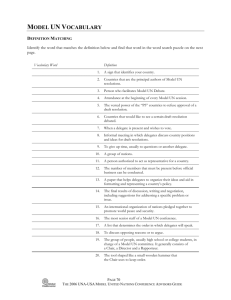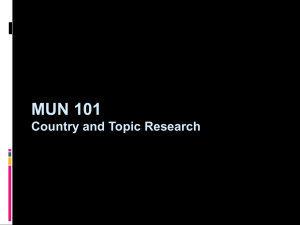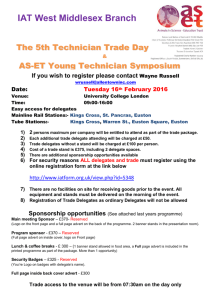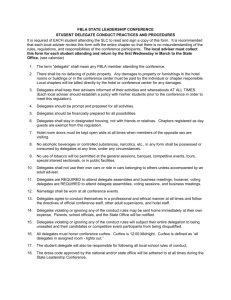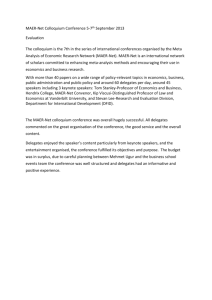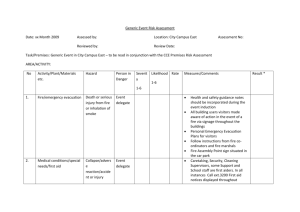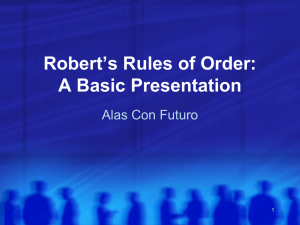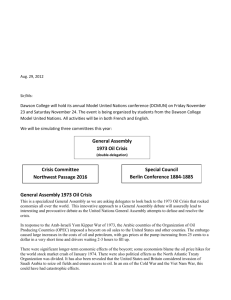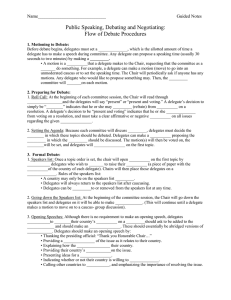Debates - MINTMUN
advertisement
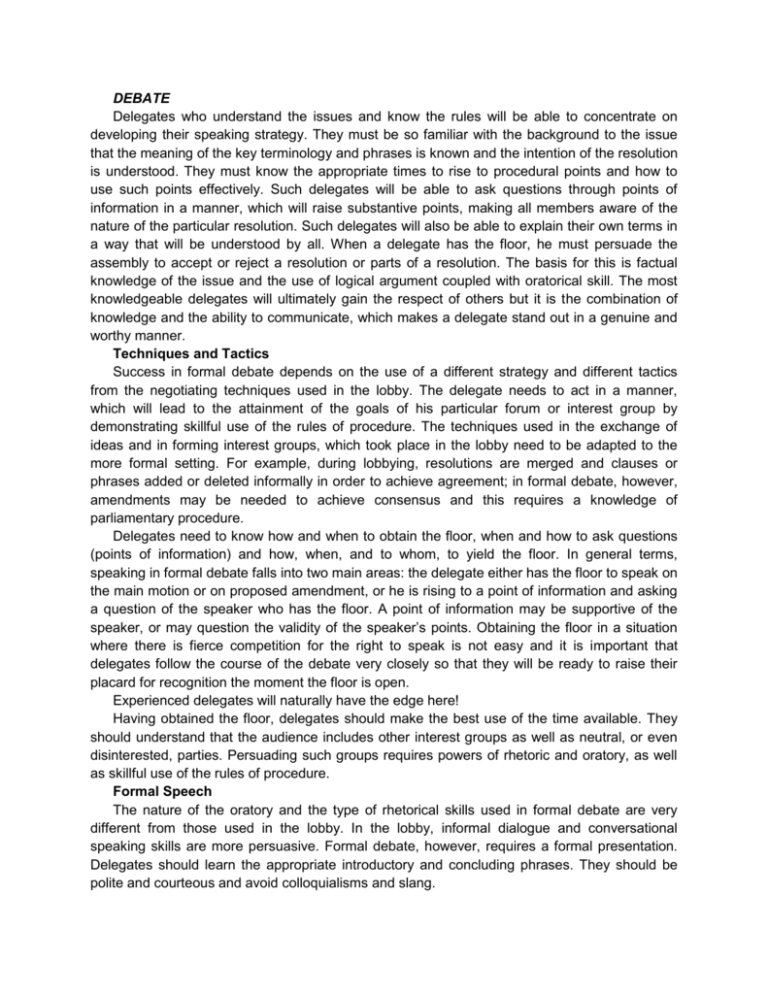
DEBATE Delegates who understand the issues and know the rules will be able to concentrate on developing their speaking strategy. They must be so familiar with the background to the issue that the meaning of the key terminology and phrases is known and the intention of the resolution is understood. They must know the appropriate times to rise to procedural points and how to use such points effectively. Such delegates will be able to ask questions through points of information in a manner, which will raise substantive points, making all members aware of the nature of the particular resolution. Such delegates will also be able to explain their own terms in a way that will be understood by all. When a delegate has the floor, he must persuade the assembly to accept or reject a resolution or parts of a resolution. The basis for this is factual knowledge of the issue and the use of logical argument coupled with oratorical skill. The most knowledgeable delegates will ultimately gain the respect of others but it is the combination of knowledge and the ability to communicate, which makes a delegate stand out in a genuine and worthy manner. Techniques and Tactics Success in formal debate depends on the use of a different strategy and different tactics from the negotiating techniques used in the lobby. The delegate needs to act in a manner, which will lead to the attainment of the goals of his particular forum or interest group by demonstrating skillful use of the rules of procedure. The techniques used in the exchange of ideas and in forming interest groups, which took place in the lobby need to be adapted to the more formal setting. For example, during lobbying, resolutions are merged and clauses or phrases added or deleted informally in order to achieve agreement; in formal debate, however, amendments may be needed to achieve consensus and this requires a knowledge of parliamentary procedure. Delegates need to know how and when to obtain the floor, when and how to ask questions (points of information) and how, when, and to whom, to yield the floor. In general terms, speaking in formal debate falls into two main areas: the delegate either has the floor to speak on the main motion or on proposed amendment, or he is rising to a point of information and asking a question of the speaker who has the floor. A point of information may be supportive of the speaker, or may question the validity of the speaker’s points. Obtaining the floor in a situation where there is fierce competition for the right to speak is not easy and it is important that delegates follow the course of the debate very closely so that they will be ready to raise their placard for recognition the moment the floor is open. Experienced delegates will naturally have the edge here! Having obtained the floor, delegates should make the best use of the time available. They should understand that the audience includes other interest groups as well as neutral, or even disinterested, parties. Persuading such groups requires powers of rhetoric and oratory, as well as skillful use of the rules of procedure. Formal Speech The nature of the oratory and the type of rhetorical skills used in formal debate are very different from those used in the lobby. In the lobby, informal dialogue and conversational speaking skills are more persuasive. Formal debate, however, requires a formal presentation. Delegates should learn the appropriate introductory and concluding phrases. They should be polite and courteous and avoid colloquialisms and slang. Preparing a Speech In preparing speeches, delegates need to be aware of the strengths and weaknesses not only of their own but also of their opponents’ case. They should list these and prepare arguments and counter-arguments, so that they will be in a position to defend as well as attack. The argument must be structured. Again, delegates should think about their audience and remember that a speech is heard only once. It needs to leave a strong impression, since other speeches will follow, perhaps obscuring or even obliterating, the so-carefully-thought-out arguments. Even at the preparation stage, the delegate needs to give some thought to his oratorical, rhetorical and polemical technique. Apart from building repetitions, catch phrases, statistics, quotations, anecdotes and examples into his speech in order to enliven it, the delegate should also decide on what stance he is taking (firm, dogmatic, ironic, conciliatory etc.) and the image he wants to project (idealistic, revolutionary, moderate etc.) and select the appropriate levels of language. Delivering a Speech When making his speech, the delegate should deliver it in a clear, loud voice, especially when no microphones are available. There is nothing more frustrating to an audience than not being able to hear a speech and the speaker does not want to be constantly interrupted by: “Point of Personal Privilege!” Every speech should have a clear beginning, e.g. “Mr. Chairman, ladies and gentlemen, Our delegation supports this resolution because...”. There must be a clear development of argument and an obvious end, e.g. “Therefore, We urge the committee to vote in favor of this resolution and We are now open to points of information”. The audience will remember the important points in a short well-structured speech much more easily than if they have to sift them out of a long, confused, rambling one. Delegates should select their most important points and arrange them in an ascending order of importance in order to achieve a climax with the final point. The points should be numbered as this is not only helpful to the speaker in delivering the speech but also to the audience in remembering it.
